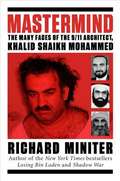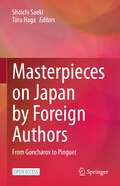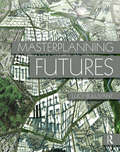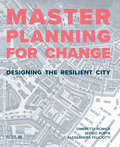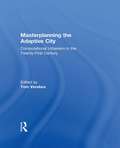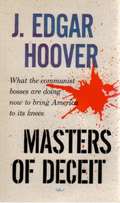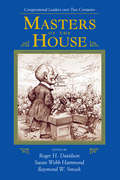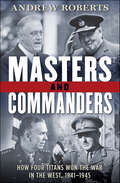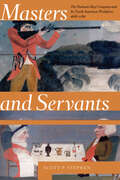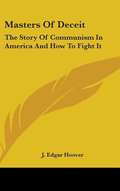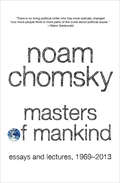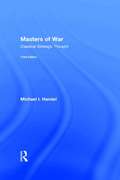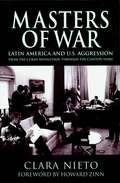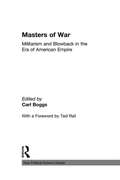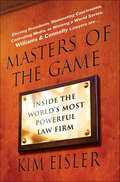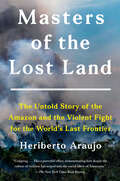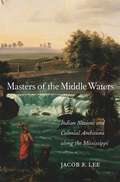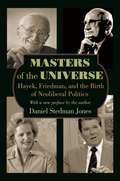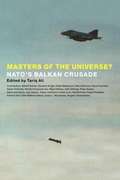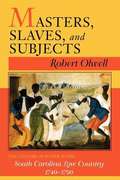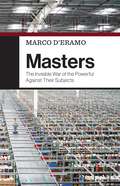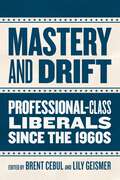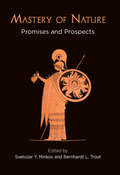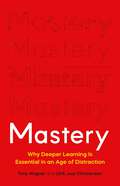- Table View
- List View
Mastermind
by Richard MiniterThe bestselling author of Shadow War and Losing Bin Laden exposes the sinister Al Qaeda mastermind behind 9/11. Khalid Shaikh Mohammed, the architect of the 9/11 attacks, has carried out many of the biggest terrorist plots of the past twenty years, including the 1993 World Trade Center bombing, the Millennium Plots, and the beheading of Daniel Pearl. As the world awaits his trial, bestselling author and investigative journalist Richard Miniter brings to life his shocking true story. Based on more than one hundred interviews with government officials, generals, diplomats and spies-from the United States, Europe, the Arab world, and Afghanistan-and on the ground reporting from Morocco, Egypt, Israel, Afghanistan, Pakistan, the Philippines, and Guantánamo Bay, Miniter reveals never-before-reported Al Qaeda plots and surprising new details about the 9/11 attacks. He also shows how Khalid Shaikh Mohammed was radicalized in America and takes us inside terrorist safe houses, CIA war rooms, and the cages of Guantánamo Bay. While thoroughly reported and strongly sourced, this is a pounding narrative that reads like a thriller.
Masterpieces on Japan by Foreign Authors: From Goncharov to Pinguet
by Shōichi Saeki Tōru HagaThis open access book includes forty-one chapters about foreign observers’ discourses on Japan. These include a wide range of perspectives from the travelogues of curious visitors to academic theses by scholars, which offer us a broad spectrum of contents, reflecting a variety of attitudes toward Japan. The works were written during the period from the 1850s to the 1980s, a timespan during which Japan became, in stages, more open to the outside world after a long isolation under the Tokugawa shogunate. From the perspective of “Japanology,” one can discern three distinct periods of rising interest in the country from abroad. The first tide of such interest came shortly after the opening of Japan, when various foreign travelers, including those who could not be included in this book, came over and wrote down their impressions of the country—which was, for them, a land of mystery and mystique, which had just opened its doors to them. The second wave arose at the beginning of the twentieth century, just after the Russo-Japanese War, when Japan again generated a remarkable surge of interest as a “miracle” in Asia that had pulled off the wondrous feat of defeating a white superpower. The third wave was more recent, which took place from the late 1960s to the 1980s, a period of high economic growth when the “miracle” of Japan’s remarkable economic recovery from the defeat of World War II attracted enthusiastic and curious attention from the outside world once again. It is not the intention of this book to directly highlight such historical transitions, but these forty-two brilliant mirrors (forty-one chapters, including forty-two discourses), even when looked in casually, provide us with unexpected insights and various perspectives. Shōichi Saeki (1922–2016) was Professor Emeritus, the University of Tokyo. Tōru Haga (1931–2020) was Professor Emeritus, International Research Center for Japanese Studies.
Masterplanning Futures
by Lucy BullivantWinner of the Urban Design Group's 2014 Book of the Year Award! In the past, spatial masterplans for cities have been fixed blueprints realized as physical form through conventional top down processes. These frequently disregarded existing social and cultural structures, while the old modernist planning model zoned space for home and work. At a time of urban growth, these models are now being replaced by more adaptable, mixed use plans dealing holistically with the physical, social and economic revival of districts, cities and regions. Through today’s public participative approaches and using technologically enabled tools, contemporary masterplanning instruments embody fresh principles, giving cities a greater resilience and capacity for social integration and change in the future. Lucy Bullivant analyses the ideals and processes of international masterplans, and their role in the evolution of many different types of urban contexts in both the developed and developing world. Among the book’s key themes are landscape-driven schemes, social equity through the reevaluation of spatial planning, and the evolution of strategies responding to a range of ecological issues and the demands of social growth. Drawing on first-hand accounts and illustrated throughout with colour photographs, plans and visualizations, the book includes twenty essays introduced by an extensive overview of the field and its objectives. These investigate plans including one-north Singapore, Masdar City in Abu Dhabi, Xochimilco in Mexico City and Waterfront Seattle, illuminating their distinct yet complementary integrated strategies. This is a key book for those interested in today’s multiscalar masterplanning and conceptually advanced methodologies and principles being applied to meet the challenges and opportunities of the urbanizing world. The author's research was enabled by grants from the Commission for Architecture and the Built Environment (CABE), the SfA (the Netherlands Architecture Fund), the Danish Embassy and support from the Alfred Herrhausen Society.
Masterplanning for Change: Designing the Resilient City
by Sergio Porta Ombretta Romice Alessandra FeliciottiCities are under increased pressure to be resilient and resistant to the effects of climate change and rapid urbanisation. However, this idea has still not been fully integrated in to practice. This book presents a practical approach to masterplanning the city and its areas (existing and new) as urban environments for the 21st century, addressing the design of cities as complex adaptive systems.
Masterplanning the Adaptive City: Computational Urbanism in the Twenty-First Century
by Tom VerebesComputational design has become widely accepted into mainstream architecture, but this is the first book to advocate applying it to create adaptable masterplans for rapid urban growth, urban heterogeneity, through computational urbanism. Practitioners and researchers here discuss ideas from the fields of architecture, urbanism, the natural sciences, computer science, economics, and mathematics to find solutions for managing urban change in Asia and developing countries throughout the world. Divided into four parts (historical and theoretical background, our current situation, methodologies, and prototypical practices), the book includes a series of essays, interviews, built case studies, and original research to accompany chapters written by editor Tom Verebes to give you the most comprehensive overview of this approach. Essays by Marina Lathouri, Jorge Fiori, Jonathan Solomon, Patrik Schumacher, Peter Trummer, and David Jason Gerber. Interviews with Dana Cuff, Xu Wei Guo, Matthew Prior, Tom Barker, Su Yunsheng, and Brett Steele. Built case studies by Zaha Hadid Architects, James Corner Field Operations, XWG Studio, MAD, OCEAN Consultancy Network, Plasma Studio, Groundlab, Peter Trummer, Serie Architects, dotA, and Rocker-Lange Architects.
Masters Of Deceit: The Story Of Communism In America And How To Fight It (large Print Edition)
by J. Edgar HooverThe Director of the Federal Bureau of Investigation explains the startling facts about the major menace of our time, communism: what it is, how it works, what its aims are, the real dangers it poses, and what loyal American citizens must know to protect their freedom.MASTERS OF DECEIT is a powerful and informative book--a firsthand account of American communism from its beginnings to the present, written by a man more intimately familiar with the complete story than any other American. Mr. Hoover shows the day-to-day operations of the Communist Party, USA: who the communists are, what they claim, why people be-come communists and why some break away. He describes life within the Party, communist strategy and tactics, methods of mass agitation and underground infiltration, espionage, sabotage, and its treatment of minorities. The picture of what life in this country would be under communism (toward which thou-sands of misguided Americans actually are working now!) is vivid and shocking.The forceful, driving message of this book is clarified with many incidents and anecdotes, definitions of communist terms, key dates, and a list of international communist organizations and publications which illustrate the communist Trojan horse in action. And it concretely outlines just what you can do now to combat the evils of the "false religion" of communism, so that you can stay free.MASTERS OF DECEIT is one of the most important books of our time--a warning of the clear and present danger to our way of life.
Masters Of The House: Congressional Leadership Over Two Centuries (Transforming American Politics (4th Edition))
by Roger DavidsonMuch of this nations political life and public policy have been shaped by a handful of powerful peoplethe leaders of the U.S. House of Representatives. Masters of the House identifies enduring patterns of House leadership, explaining the effects of such factors as party strength, White HouseCongressional relations, leaders formal prerogatives, members expectations, public attitudes, shifts in the policy agenda, and leaders personal attributes and style. Ten chapters cover such colorful and diverse personalities as Henry Clay, Joe Cannon, Hale Boggs, and Tip ONeill. Coeditors Roger Davidson, Susan Hammond, and Raymond Smock have blended essays by political scientists, historians, and journalists into an integrated treatment of House leadership over time, including an analysis of emerging trends in the 1990s. Much of this nations political life and public policy have been shaped by a handful of powerful peoplethe leaders of the U. S. House of Representatives. Masters of the House identifies enduring patterns of House leadership, explaining the effects of such factors as party strength, White HouseCongressional relations, leaders formal prerogatives, members expectations, public attitudes, shifts in the policy agenda, and leaders personal attributes and style. Ten chapters cover such colorful and diverse personalities as Henry Clay, Joe Cannon, Hale Boggs, and Tip ONeill. Coeditors Roger Davidson, Susan Hammond, and Raymond Smock have blended essays by political scientists, historians, and journalists into an integrated treatment of House leadership over time, including an analysis of emerging trends in the 1990s.
Masters and Commanders: How Four Titans Won the War in the West, 1941–1945
by Andrew RobertsThis joint WWII biography of Roosevelt, Churchill, Marshall, and Brooke “is a triumph of vivid description, telling anecdotes, and informed analysis” (The New York Review of Books).Masters and Commanders explores the degree to which the course of the Second World War turned on the relationships and temperaments of four of the strongest personalities of the twentieth century: political masters Winston Churchill and Franklin D. Roosevelt and the commanders of their armed forces, General Sir Alan Brooke and General George C. Marshall.Each was exceptionally tough-willed and strong-minded, and each was certain that only he knew best how to win the war. Andrew Roberts, “Britain's finest contemporary military historian” (The Economist), traces the mutual suspicion and admiration, the rebuffs and the charm, the often-explosive disagreements and wary reconciliations, and he helps us to appreciate the motives and imperatives of these key leaders as they worked tirelessly in the monumental struggle to destroy Nazism.
Masters and Servants: The Hudson's Bay Company and Its North American Workforce, 1668–1786
by Scott P. Stephen“[Stephen] offers fresh insight into the path a historic fur trading business took to become one of Canada’s most recognizable retailers.” —Literary Review of CanadaIn Masters and Servants, Scott P. Stephen reveals startling truths about Hudson’s Bay Company (HBC) workers. Rather than dedicating themselves body and soul to the Company’s interests, these men were hired like domestic servants, joining a “household” with its attendant norms of duty and loyalty. The household system produced a remarkably stable political-economic entity, connecting early North American resource extraction to larger trends in British imperialism. Through painstaking research, Stephen shines welcome light on the lives of these largely overlooked individuals. An essential book for labor historians, Masters and Servants will appeal to scholars of early modern Britain, the North American fur trade, Western social history, business history, and anyone intrigued by the reach of the HBC.“Blacksmiths, bookkeepers, loggers, tanners, coopers, cooks, sail-makers, interpreters, surveyors, clergy, the list goes on as Stephen marches us through the lives of the early Hudson’s Bay worker.” —The Ormsby Review“Overall, the book reflects the work of a historian comfortable with the hard work of archival research and with an eye for detail and insightful quotations. In many respects, it does for Hudson’s Bay Company employees what Carolyn Podruchny’s Making the Voyageur World did for employees of the Montreal-based fur trade companies in recreating their values, worldview, and distinctive work environment.” —Michael Payne, Prairie History
Masters of Deceit
by J. Edgar HooverContents: Who is Your Enemy? How Communism Began; The Communist Appeal in the U.S.; Life in the Party; The Communist Trojan Horse in Action; The Communist Underground; Bibliography of Major Communist Classics.
Masters of Mankind: Essays and Lectures, 1969-2013
by Noam ChomskyEssays that reflect the changing climate of the United States and the world from &“perhaps the most widely read voice on foreign policy on the planet&” (The New York Times Book Review). In this collection of essays from 1969 to 2013, many in book form for the first time, Noam Chomsky examines the nature of state power, from the ideologies driving the Cold War to the War on Terror, and reintroduces the moral and legal questions that all too often go unheeded. With unrelenting logic, he holds the arguments of empire up to critical examination and shatters the myths of those who protect the power and privilege of the few against the interests and needs of the many. A new introduction by Marcus Raskin contextualizes Chomsky&’s place among some of the most influential thinkers of modern history. Praise for Noam Chomsky and Masters of Mankind &“Considering that Chomsky&’s relevance has only grown with time, and that his positions prove less radical and more prescient as years pass, the timing of his new book release, The Masters of Mankind, a retrospective of lectures and essays stretching from 1969 to 2013, is perfect . . . There is more than enough profound, powerful material in this collection to impress any readers unfamiliar with Chomsky&’s intellectual agility.&” —The Daily Beast &“There is no living political writer who has more radically changed how more people think in more parts of the world about political issues.&” ―Glenn Greenwald, journalist and author &“A truth-teller on an epic scale. I salute him.&” —John Pilger, journalist, writer, and filmmaker
Masters of War: Classical Strategic Thought
by Michael I. HandelThis is the first comprehensive study based on a detailed textual analysis of the classical works on war by Clausewitz, Sun Tzu, Mao Tse-tung, and to a lesser extent, Jomini and Machiavelli. Brushing stereotypes aside, the author takes a fresh look at what these strategic thinkers actually said—not what they are widely believed to have said. He finds that despite their apparent differences in terms of time, place, cultural background, and level of material/technological development, all had much more in common than previously supposed. In fact, the central conclusion of this book is that the logic of waging war and of strategic thinking is as universal and timeless as human nature itself. This third, revised and expanded edition includes five new chapters and some new charts and diagrams.
Masters of War: Latin American and U.S. Aggression from the Cuban Revolution Through the Clinton Years
by Howard Zinn Clara Nieto Chris BrandtIn Masters of War, Clara Nieto adeptly presents the parallel histories of the countries of Latin America, histories that are intertwined, each reflecting the United States' "coherent policy of intervention" set into motion by the Monroe Doctrine. As the value of this continued policy comes increasingly into question, Nieto argues for the need to evaluate the alarming precedent set in Latin America: the institution of client dictatorships, the roles played by the interests of U.S. corporations, the enormous tolls taken on civilian populations, and the irreversible disruption of regional stability.Drawing from an impressive array of documents and sources as well as from her unique first-hand insights as a participant in crucial meetings and negotiations in the region from the mid-1960s through the mid-1980s, Nieto chronicles the Cuban Revolution, the CIA-sponsored coup against popularly elected President Allende in Chile, the U.S. invasions of Panama and Grenada, U.S. support for the cultivation and training of paramilitary death squads in Nicaragua, El Salvador, and Colombia, as well as similarly severe but less well-known situations in other countries such as Uruguay, Venezuela, Argentina, Peru, Bolivia, Honduras, and Guatemala.Masters of War offers, from an informed perspective, perhaps for the first time, a distanced, objective analysis of recent Latin American history. Clara Nieto's depth of knowledge and understanding is an invaluable resource at a time when the media is seen as unapologetically aligned with the interests of major corporations and policymakers, and the American public has reached a new height of apprehension regarding the intentions behind and consequences of its government's policies.
Masters of War: Militarism and Blowback in the Era of American Empire (New Political Science Reader)
by Ted Rall Carl BoggsFirst published in 2003. Routledge is an imprint of Taylor & Francis, an informa company.
Masters of the Game: Inside the World's Most Powerful Law Firm
by Kim EislerA veteran legal reporter reveals the inner workings of Washington’s most powerful law firm with “vivid, savvy reportage” (Kirkus Reviews).For decades, journalist Kim Eisler has covered the law firm of Williams & Connolly as its partners have risen to key positions in American politics, business, and culture. From presidential impeachments to professional sports teams, from the Iran-Contra scandal to the rise of Sarah Palin, Williams & Connolly has been behind the scenes. Now, with her deep knowledge and unprecedented access to its partners, Eisler reveals how Williams & Connolly has attained such power and influence.Eisler begins with the firm’s founder, Edward Bennett Williams, who often said he was building not just a law firm but a monument. Masters of the Game shows how his disciples carried his philosophy and practices beyond Washington to dominate business, media, finance, sports and the American psyche itself.
Masters of the Lost Land: The Untold Story of the Amazon and the Violent Fight for the World's Last Frontier
by Heriberto AraujoIn the tradition of Killers of the Flower Moon, a haunting murder mystery revealing the human story behind one of the most devastating crimes of our time: the ruthless destruction of the Amazon rain forest—and anyone who stands in the wayDeep in the heart of the Amazon, the city of Rondon do Pará, Brazil, lived for decades in the shadow of land barons, or fazendeiros, who maintained control of the region through unscrupulous land grabs and egregious human rights violations. They razed and burned the jungle, expelled small-scale farmers and Indigenous tribes from their lands, and treated their farmhands as slaves—all with impunity. The only true opposition came from Rondon’s small but robust farmworkers’ union, led by the charismatic Dezinho, who fought to put power back into the hands of the people who called the Amazon home. But when Dezinho was assassinated in cold blood, it seemed the farmworkers’ struggle had come to a violent and fruitless end.What no one anticipated was that this event would bring forth an unlikely hero: Dezinho’s widow. Against great odds, and at extreme personal risk, Maria Joel, now a single mother of four young children, used her ingenuity and unwavering support from union members to bring her husband’s killer to account in court. Her campaign gained unexpected momentum, helping to bring international attention to the dire situation in Rondon, from Brazil’s president Lula to international celebrities and civil rights groups.Maria Joel’s fight for justice had far-reaching implications: it unearthed a chilling world of corruption and lawlessness rooted in Brazil’s quest to turn the largest rain forest on earth into an economic frontier. As more details came out, it began to look increasingly likely that Dezinho’s killer, a reluctant and inexperienced gunman, was just one piece of a larger criminal consortium, with ties leading all the way up to one of the region’s most powerful and notorious fazendeiros of all.Featuring groundbreaking revelations and exclusive interviews, this gripping work of narrative nonfiction is the culmination of journalist Heriberto Araujo’s years-long investigation in the heart of the Amazon. Set against the backdrop of appalling deforestation rates and resultant superfires, Masters of the Lost Land vividly reveals the human story behind the loss of—and fierce crusade to protect—one of our greatest resources in the fight against climate change and one of the last wild places on earth.
Masters of the Middle Waters: Indian Nations and Colonial Ambitions along the Mississippi
by Jacob F. LeeJacob Lee offers a new understanding of the conquest of the American West based on the long history of warfare and resistance in the Mississippi River valley. The river and its tributaries were never simply a backdrop to unfolding events but advanced and thwarted the aspirations of Native nations, European imperialists, and American settlers alike.
Masters of the Universe, Slaves of the Market
by Stephen BellStephen Bell and Andrew Hindmoor compare banking systems in the U.S. and UK to those of Canada and Australia and explain why the system imploded in the former but not the latter. Canadian and Australian banks were able to make profits through traditional lending practices, unlike their competition-driven, risk-taking U.S. and UK counterparts.
Masters of the Universe: Hayek, Friedman, and the Birth of Neoliberal Politics - Updated Edition
by Daniel Stedman JonesHow radical free-market ideas achieved mainstream dominance in postwar America and BritainBased on archival research and interviews with leading participants in the movement, Masters of the Universe traces the ascendancy of neoliberalism from the academy of interwar Europe to supremacy under Reagan and Thatcher and in the decades since. Daniel Stedman Jones argues that there was nothing inevitable about the victory of free-market politics. Far from being the story of the simple triumph of right-wing ideas, the neoliberal breakthrough was contingent on the economic crises of the 1970s and the acceptance of the need for new policies by the political left. This edition includes a new foreword in which the author addresses the relationship between intellectual history and the history of politics and policy.Fascinating, important, and timely, this is a book for anyone who wants to understand the history behind the Anglo-American love affair with the free market, as well as the origins of the current economic crisis.
Masters of the Universe: NATO's Balkan Crusade
by Tariq AliNATO’s war on Yugoslavia in the spring of 1999 was unleashed in the name of democracy and human rights. This view was challenged by the world’s three largest countries, India, China and Russia, who saw the bombing of Serbia and Kosovo as a naked attempt to assert US dominance in an unstable world. In the West, media networks were joined by substantial sectors of left/liberal opinion in supporting the war. Nonetheless, a wide variety of figures emerged to challenge the prevailing consensus. Their work, gathered here for the first time, forms a collection of key statements and anti-war writings from some of democracy’s most eloquent dissidents—Noam Chomsky, Harold Pinter, Edward Said and many others—who provide carefully researched examinations of the real motives for the US action, dissections and critiques of the ideology of ‘humanitarian warfare’, and chartings of the unnecessary tragedy of a region laid to waste in the pursuance of Great Power politics. This reader presents some of the most important texts on NATO’s Balkan crusade and forms a major intervention in the debate on global geo-political strategy after the Cold War.
Masters, Slaves, And Subjects: The Culture Of Power In The South Carolina Low Country, 1740-1790
by Robert OlwellThe slave societies of the American colonies were quite different from the "Old South" of the early-nineteenth-century United States. In this engaging study of a colonial older South, Robert Olwell analyzes the structures and internal dynamics of a world in which both masters and slaves were also imperial subjects. While slavery was peculiar within a democratic republic, it was an integral and seldom questioned part of the eighteenth-century British empire. Olwell examines the complex relations among masters, slaves, metropolitan institutions, officials, and ideas in the South Carolina low country from the end of the Stono Rebellion through the chaos of the American Revolution. He details the interstices of power and resistance in four key sites of the colonial social order: the criminal law and the slave court; conversion and communion in the established church; market relations and the marketplace; and patriarchy and the plantation great house. Olwell shows how South Carolina's status as a colony influenced the development of slavery and also how the presence of slavery altered English ideas and institutions within a colonial setting. Masters, Slaves, and Subjects is a pathbreaking examination of the workings of American slavery within the context of America's colonial history.
Masters: The Invisible War of the Powerful Against Their Subjects
by Marco D'EramoFrom the breweries of Colorado and the faculties of Harvard to the Nobel Prize ceremonies in Stockholm, Marco D’Eramo guides us through the places where a new war has been thought out, planned and financed. It’s a real war, though it has been fought silently, without us realizing it. Warren Buffett, one of the richest men in the world, said it best: ‘There’s class warfare, all right, but it’s my class, the rich class, that’s making war, and we’re winning’. The revolt from above has affected all fields – not only the economy, but also justice and education. It has twisted our ideas of society, family and ourselves. It has taken advantage of every crisis, whether natural disasters, terrorist attacks, recessions or pandemics. It has used every weapon, from the information revolution to the technology of debt. It has changed the nature of power, from discipline to control. It has learnt from the workers’ struggle, using Gramsci and Lenin against them. Maybe the time has come for us to do the same and to learn from our opponents.
Mastery and Drift: Professional-Class Liberals since the 1960s
by Lily Geismer Brent CebulA revelatory look at modern liberalism’s historical evolution and enduring impact on contemporary politics and society. Since the 1960s, American liberalism and the Democratic Party have been remade along professional class lines, widening liberalism’s impact but narrowing its social and political vision. In Mastery and Drift, historians Brent Cebul and Lily Geismer have assembled a group of scholars to address the formation of “professional-class liberalism” and its central role in remaking electoral politics and the practice of governance. Across subjects as varied as philanthropy, consulting, health care, welfare, race, immigration, economics, and foreign conflicts, the authors examine not only the gaps between liberals’ egalitarian aspirations and their approaches to policymaking but also how the intricacies of contemporary governance have tended to bolster professional-class liberals’ power. The contributors to Mastery and Drift all came of age amid the development of professional-class liberalism, giving them distinctive and important perspectives in understanding its internal limitations and its relationship to neoliberalism and the Right. With never-ending disputes over the meaning of liberalism, the content of its governance, and its relationship to a resurgent Left, now is the time to consider modern liberalism’s place in contemporary American life.
Mastery of Nature: Promises and Prospects
by Svetozar Y. Minkov Bernhardt L. TroutIn the early modern period, thinkers began to suggest that philosophy abjure the ideal of dispassionate contemplation of the natural world in favor of a more practically minded project that aimed to make human beings masters and possessors of nature. Humanity would seize control of its own fate and overthrow the rule by hostile natural or imaginary forces. The gradual spread of liberal democratic government, the Enlightenment, and the rise of technological modernity are to a considerable extent the fruits of this early modern shift in intellectual concern and focus. But these long-term trends have also brought unintended consequences in their wake as the dynamic forces of social reason, historical progress, and the continued recalcitrance of the natural world have combined to disillusion humans of the possibility—even the desirability—of their mastery over nature.The essays in Mastery of Nature constitute an extensive analysis of the fundamental aspects of the human grasp of nature. What is the foundation and motive of the modern project in the first place? What kind of a world did its early advocates hope to bring about? Contributors not only examine the foundational theories espoused by early modern thinkers such as Machiavelli, Bacon, Descartes, and Hobbes but also explore the criticisms and corrections that appeared in the works of Rousseau, Kant, Nietzsche, and Heidegger. Ranging from ancient Greek thought to contemporary quantum mechanics, Mastery of Nature investigates to what extent nature can be conquered to further human ends and to what extent such mastery is compatible with human flourishing.Contributors: Robert C. Bartlett, Mark Blitz, Daniel A. Doneson, Michael A. Gillespie, Ralph Lerner, Paul Ludwig, Harvey C. Mansfield, Arthur Melzer, Svetozar Y. Minkov, Christopher Nadon, Diana J. Schaub, Adam Schulman, Devin Stauffer, Bernhardt L. Trout, Lise van Boxel, Richard Velkley, Stuart D. Warner, Jerry Weinberger.
Mastery: Why Deeper Learning Is Essential in an Age of Distraction
by Tony Wagner Ulrik Juul Christensen&“If you&’ve ever wondered why our education system feels stuck in the past, this book delivers both a powerful critique and a bold vision for the future.&” —Daniel H. Pink, #1 New York Times–bestselling author of Drive How much information is forgotten almost immediately after it is taught? How many students graduate from high school unprepared for careers where lifelong learning is essential to succeed? These problems stem from an educational system that uses time spent in a classroom and the results of standardized, multiple-choice tests as proxies for actual understanding. Educators Tony Wagner and Ulrik Juul Christensen call for a radical new system of learning, where students progress individually when they demonstrate that they can use what they have learned—no matter how long it takes to get there. This is called mastery learning, and it is the future of education. This book shows how mastery learning is already being put to use in the United States and around the world, from kindergarten to college and in the workplace. Through conversations with teachers, students, parents, policymakers, and employers, Wagner and Christensen show how mastery improves motivation and prepares students for productive work, an engaged civic life, and personal growth and well-being. They also outline the challenges of adopting mastery learning and how to overcome them. Mastery is an urgent call to action to transform education for all.
